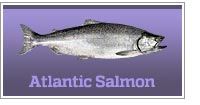Fishing For Salmon In Vermont
Guide to fishing for landlocked Atlantic salmon in VT
Atlantic Salmon
Known as the “king of fish”, Atlantic salmon live in both fresh and saltwater, which means they are anadromous. They are renowned for their impressive athleticism, and delectable taste. Native to the North Atlantic Ocean, these fish undertake extraordinary journeys from their natal rivers to distant feeding grounds in the open ocean and back again to spawn. In recent years, the allure of fishing for landlocked Atlantic salmon in lakes has grown in popularity. Anglers most often target landlocked salmon by trolling open water. The pursuit of landlocked Atlantic salmon also comes with a responsibility. Conservation efforts are essential to ensure the long-term sustainability of these populations. Anglers must follow local regulations, and support habitat restoration initiatives to safeguard the future of this cherished species.
Salmon Fishing Water in Vermont
Lake Champlain is the most prolific salmon lake in VT. Other major lakes in with healthy populations of landlocked Atlantic salmon include Harriman Reservoir, Lake Memphremagog, Lake Willoughby and Seymour Lake.
Fishing for salmon in Vermont
Atlantic salmon
World record: 79 lbs 2 oz
State Record: 12 lbs 10.4 oz
Click the images and links above for species details.
Vermont State Record Salmon
The state record Atlantic salmon was caught from Lake Champlain.
Vermont Salmon Fishing
The preferred method for catching salmon is fly fishing. Depending on the activity level, salmon may be caught on wet or dry flies, as well as a variety of other lures and baits.
The preferred method for catching salmon is fly fishing. Depending on the activity level, salmon may be caught on wet or dry flies. For more details check here for articles about fly fishing.
About The Pacific Salmon Family
Pacific Salmon are born in and remain in freshwater streams for the early years of life. The number varies by species. Afterward they migrate to the Pacific Ocean waters where they bulk up and prepare for their once in a lifetime spawning run up the freshwater stream where they were born. They will instinctively return to their birthplace, spawn and die. They are found in the streams which empty into the ocean, and adjoining ocean waters.
Salmon Organizations
Salmon fishing waters and information, by state
101524*





